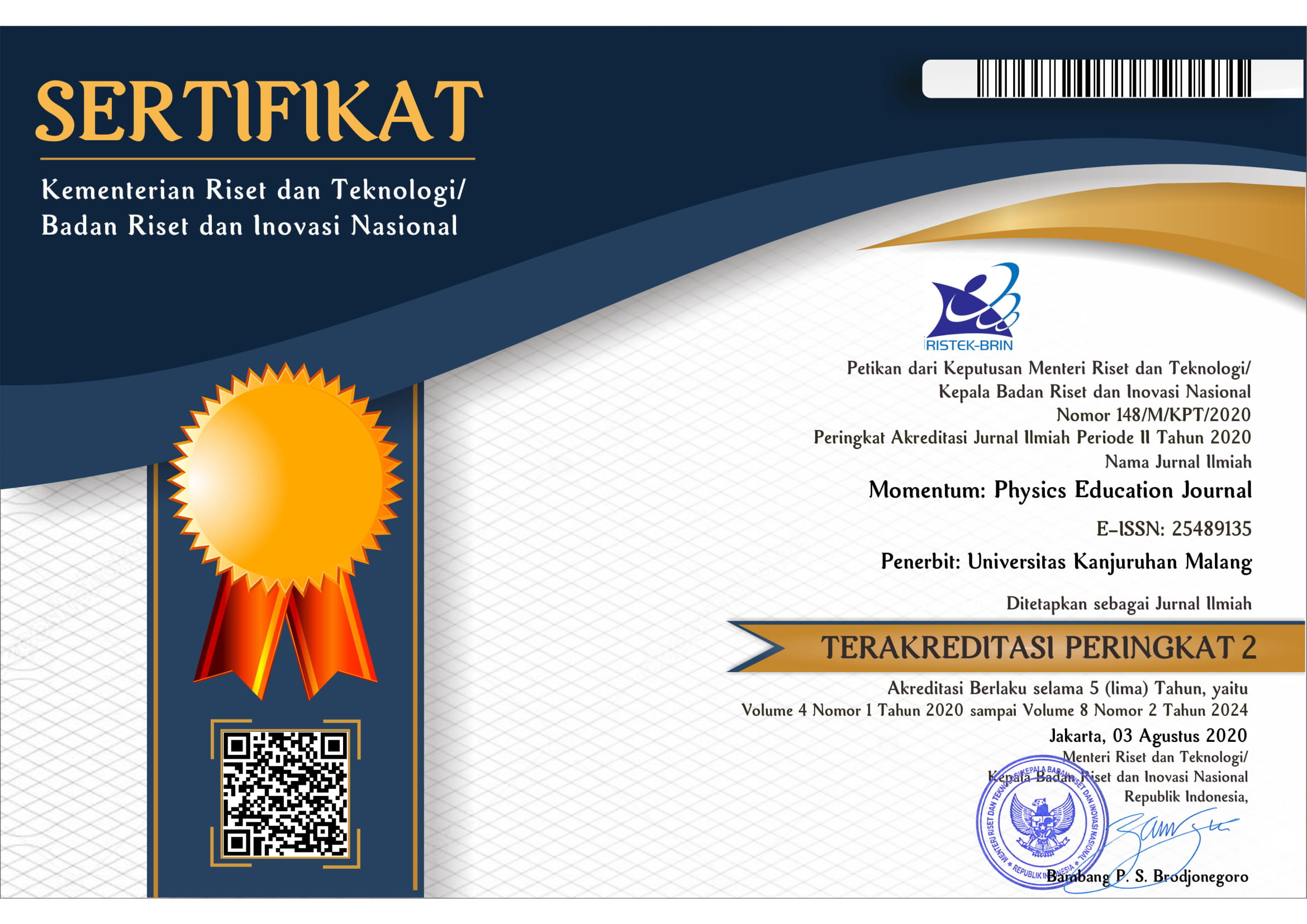The Effect of Assessment for Learning Integration in Scientific Approach Towards Students’ Conceptual Understanding on Work and Energy
DOI:
https://doi.org/10.21067/mpej.v3i2.3761Keywords:
assessment for Learning (AfL), conceptual understanding, scientific approach, work and energyAbstract
This study aims to determine the effect of the integrated assessment for Learning (AfL) which is assisted by the Tryout application in scientific approach on students' conceptual understanding. This study used a quasi-experimental method with a pretest-posttest control group design. This research was conducted at a high school in Malang with a sample of two classes by a random cluster sampling technique. There were two classes involved, namely one as an experimental class (using an integrated AfL assisted with a tryout application in scientific approach) and one as a control class (using a scientific approach through assignment instructions). Thirthy four students in each class were tough the work and energy topic. The test instrument used was 20 reasoned multiple-choice questions with a reliability of 0.62. Data were analyzed using descriptive analysis and inferential statistics. The results showed that there was a significant difference between the posttest mean scores of the experimental class students and the control class students (p = 0.017). Descriptive analysis showed that the mean scores of posttest students for the experiment and control class were 61.76 and 54.26, respectively. That means that the conceptual understanding of students who learn with integrated AfL that assisted by tryout application in scientific approach was higher than students who learn with the scientific approach through assignments.
Downloads
References
Ding, L., Chabay, R., & Sherwood, B. (2013). How do students in an innovative principle-based mechanics course understand energy concepts?: ASSESSING M&I STUDENTS’ ENERGY CONCEPTIONS. Journal of Research in Science Teaching, 50(6), 722–747. https://doi.org/10.1002/tea.21097
Diyanahesa, N. E.-H., Kusairi, S., & Latifah, E. (2017). Development of misconception diagnostic test in momentum and impulse using isomorphic problem. Journal of Physics: Theories and Applications, 1(2), 145–156. https://doi.org/10.20961/jphystheor-appl.v1i2.19314
Earl, L. (2007). Assessmentââ€Âa powerful lever for learning. Brock Education Journal, 16(1). https://doi.org/10.26522/brocked.v16i1.29
Hestenes, D., & Wells, M. (1992). A mechanics baseline test. The Physics Teacher, 30(3), 159–166. https://doi.org/10.1119/1.2343498
In’am, A., & Hajar, S. (2017). Learning geometry through discovery learning using a scientific approach. International Journal of Instruction, 10(01), 55–70. https://doi.org/10.12973/iji.2017.1014a
Kusairi, S. (2013). Analisis asesmen formatif fisika sma berbantuan komputer. Jurnal Penelitian Dan Evaluasi Pendidikan, 16, 68–87. https://doi.org/10.21831/pep.v16i0.1106
Lorente-Catalán, E., & Kirk, D. (2016). Student teachers’ understanding and application of assessment for learning during a physical education teacher education course. European Physical Education Review, 22(1), 65–81. https://doi.org/10.1177/1356336X15590352
Marjan, J., Arnyana, I. B. P., & Setiawan, I. G. A. N. (2014). Johari Marjan (2014). Pengaruh pembelajaran pendekatan saintifik terhadap hasil belajar biologi dan keterampilan proses sains siswa MA Mu’allimat NW Pancor Selong Kabupaten Lombok Timur Nusa Tenggara Barat. e-Journal Program Pascasarjana Universitas Pendidikan Ganesha, 4.
Nurmalasari, R., Kade, A., & Kamaluddin, K. (2014). Pengaruh model learning cycle tipe 7E terhadap pemahaman konsep fisika siswa kelas VII SMP Negeri 19 Palu. JPFT (Jurnal Pendidikan Fisika Tadulako Online), 1(2), 18. https://doi.org/10.22487/j25805924.2013.v1.i2.2389
Oktavia, P., Sulaeman, N. F., & Komariyah, L. (2017). Analisis penguasaan konsep usaha dan energi menggunakan certainty of response index (CRI)di SMA Negeri 3 Samarinda. Prosiding Seminar Nasional Pendidikan IPA, 27–37. Palembang: Universitas Brawijaya.
Patriot, E. A., Suhandi, A., & Chandra, D. T. (2018). Optimize scientific communication skills on work and energy concept with implementation of interactive conceptual instruction and multi representation approach. Journal of Physics: Conference Series, 1013, 012029. https://doi.org/10.1088/1742-6596/1013/1/012029
Peters, E. E. (2012). Developing content knowledge in students through explicit teaching of the nature of science: Influences of goal setting and self-monitoring. Science & Education, 21(6), 881–898. https://doi.org/10.1007/s11191-009-9219-1
Podschuweit, S., & Bernholt, S. (2018). Composition-effects of context-based learning opportunities on students’ understanding of energy. Research in Science Education, 48(4), 717–752. https://doi.org/10.1007/s11165-016-9585-z
Rahmatina, D. I., Sutopo, & Wartono. (2018). Identifikasi kesulitan siswa SMA pada materi usaha-energi. Momentum: Physics Education Journal, 2(1), 8–14.
Ramdhani, M. R., Usodo, B., & Subanti, S. (2017). Discovery learning with scientific approach on geometry. Journal of Physics: Conference Series, 895, 012033. https://doi.org/10.1088/1742-6596/895/1/012033
Sakti, I. (2013). Pengaruh media animasi fisika dalam model pembelajaran langsung (direct instruction) terhadap minat belajar dan pemahaman konsep fisika siswa di SMA Negeri Kota Bengkulu. Prosiding Semirata FMIPA Universitas Lampung, 493–498.
Santoso, P. H., & Mutmainna, M. (2018). Pembelajaran fisika berbasis nature of science (nos) untuk meningkatkan pemahaman konsep fisika peserta didik. PHYDAGOGIC Jurnal Fisika Dan Pembelajarannya, 1(1), 15–23. https://doi.org/10.31605/phy.v1i1.209
Singh, C., & Rosengrant, D. (2003). Multiple-choice test of energy and momentum concepts. American Journal of Physics, 71(6), 607–617. https://doi.org/10.1119/1.1571832
Subagya, H. (2016). Konsep dan penerapan Fisika SMA/MA Kelas X. Jakarta: PT Bumi Aksara.
Sugiyono. (2009). Metode Penelitian Kualitatif, Kuantitatif dan R&D. Bandung: Alfabeta.
Thanh Pham, T. H., & Renshaw, P. (2015). Formative assessment in Confucian heritage culture classrooms: Activity theory analysis of tensions, contradictions and hybrid practices. Assessment & Evaluation in Higher Education, 40(1), 45–59. https://doi.org/10.1080/02602938.2014.886325
Zafitri, R. E., Fitriyanto, S., & Yahya, F. (2018). Pengembangan tes diagnostik untuk miskonsepsi pada materi usaha dan energi berbasis adobe flash kelas XI di MA NW samawa Sumbawa Besar tahun ajaran 2017/2018. Jurnal Kependidikan, 2(2), 19–34. https://doi.org/10.31227/osf.io/7wyx6
Downloads
Published
How to Cite
Issue
Section
License
Momentum: Physisc Education Journal allows readers to read, download, copy, distribute, print, search, or link to the full texts of its articles and allow readers to use them for any other lawful purpose. 
This work is licensed under a Creative Commons Attribution 4.0 International License. The Authors submitting a manuscript do so with the understanding that if accepted for publication, copyright of the article shall be assigned to Momentum: Physics Education Journal


.png)
.png)
.png)
.png)





